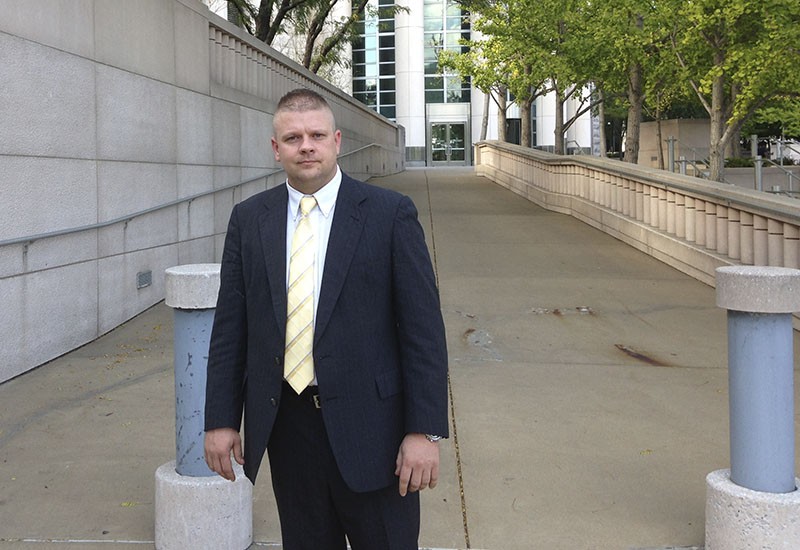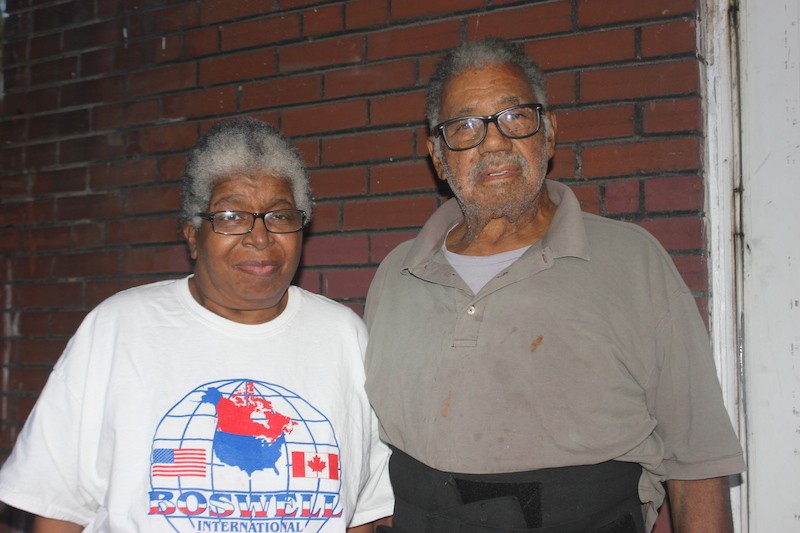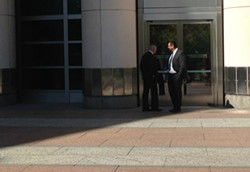As a police officer himself, Detective Sergeant John "Vito" Parisi wasn't big on arresting cops — but the guy from north county St. Louis was pushing right to the edge of what they could accept in Sauget.
"He was teetering on it," says Parisi, sitting behind his desk in the blond brick building that is home to the tiny town's police department, village hall and fire station. "You know, you want to extend every courtesy."
Parisi has been policing Sauget, Illinois, for nearly 30 years. It's always had an outlaw reputation. Originally called Monsanto, the village was incorporated in 1926 as a place where the chemical giant could operate within sight of the Arch but without the burdensome environmental oversight of St. Louis regulations. Even today it enjoys a legacy of minimal governmental interference. The smokestacks of a gauntlet of industrial plants cut across the low horizon. Where other towns have schools and grocery stores, Sauget has long, windowless strip clubs, 24-hour bars and acres of parking lot to accommodate the after-hours crowds that flow across the Mississippi River in the early morning dark.
Parisi is one of about 160 people who live in the village. He's dealt with plenty of knuckleheads who like to treat his town like St. Louis' own little sin city.
He can't remember anyone like Steven Blakeney.
"No," he says, "just because it was so bizarre."
A beefy six-footer with a military buzz cut, Blakeney was then a police sergeant in the pocket-sized north St. Louis County suburb of Pine Lawn. Known around north county St. Louis as a vindictive brute, he'd somehow managed to rocket through the ranks of his troubled department despite allegations of rape, cocaine abuse and the kind of hyperaggressive policing tactics condemned by the Justice Department after the Ferguson protests.
Eventually, he'd be fired from Pine Lawn — accused of using a police escort to take women home after he'd met them at a bar and, allegedly, drugged them. He has never been charged in the incident, although this year Blakeney was finally convicted in federal court of framing a mayoral candidate. The federal judge handling his case described him as a "disgrace." Assistant U.S. Attorney Reginald Harris opined, "This is a person who should never have been a police officer in the first place."
For years, though, he seemed untouchable. In Pine Lawn, he was thought to serve as the hammer for the city's corrupt mayor, and that gave him a certain amount of freedom.
He was a frequent visitor to Sauget, even during the night shift, when his fellow Pine Lawn cops say he was on duty. Sauget Officer Brian Phillips says he'd see Blakeney's police-issued Dodge Charger in the employee lot at the Penthouse Club five or six nights a week.
His problems in Sauget started as your garden-variety nuisance. Blakeney seemed like he wanted to play the tough guy at Pop's, a metal-sided concert hall and dance club that never closes. Security guards there told police they were busy throwing somebody out one night in January 2014 when Blakeney tried to join them.
When the bouncers tried to get Blakeney to back off, he told them he could intervene anywhere he wished. An assistant manager had to physically force Blakeney and a buddy out the door. Blakeney and his friend later slipped back inside through an employee entrance, fooling no one. Security eventually called Sauget police to get him to leave — and told him not to come back.
When Blakeney returned less than two weeks later, security ushered him away. The next night, he and a partner cruised past the front door in an unmarked police car.
They circled, returned and paused at the front entrance. One of the bouncers walked out of the club and toward the car, assuming the occupants were part of an auto-theft task force that sometimes patrolled the area. He soon realized it was Blakeney — in full tactical gear, Parisi says.
Now armed, Blakeney told the bouncer he was working on an investigation that required him to stake out the lot. He asked which Sauget police officers were working that night and fished for information about Pop's head of security. When the bouncer told him to beat it, Blakeney drove slowly away.
Blakeney was eventually banned from at least three clubs on the East Side, but he continued to show up. Parisi decided it was time that Pine Lawn kept Blakeney at home.
He called over to the department.
"Hey, this guy is nothing but trouble for us," he recalls saying. "If you would, let him know to stay out of our venue."
Not long after, a Pine Lawn officer in a police van hand-delivered an envelope to the Sauget station. Inside was a letter referencing Parisi's phone conversation, claiming, "It has been determined that the investigator(s) were found to be operating within the scope of this Department's standard operating procedures, and of course, within the scope of the statutory authority while on duty, conducting a lawful investigation(s)."
What kind of investigation would require a cop from Pine Lawn, a town of less than a square mile, to stake out a bar's parking lot twelve miles away in Illinois was never explained. "This matter is considered to be closed," the letter concluded.
It was supposedly signed by Pine Lawn Detective Lawrence Fleming, who happens to be Blakeney's longtime friend. Parisi thought the signature looked like it had been copied and pasted. He faxed a copy to Pine Lawn's new chief with a one-line message: "Please advise if this is a forgery."
He never heard back, but Blakeney stopped showing up at the clubs shortly after. Parisi says it was one of the weirdest episodes of his career.
"Just a strange, strange character," he says of Blakeney.

One of the great, unanswered questions about Steven Blakeney is less about what made him tick and more about why state and regional authorities allowed him to become a cop — and then stay one, even as complaints poured in.
Other law enforcement agencies investigated allegations against him of rape and assault. Lawsuits accused him of battering people during arrests and drugging women at bars. St. Louis city police even charged him with assault in 2014 after he allegedly sucker-punched a woman and her friend as they were leaving the Flamingo Bowl. Citizens in Pine Lawn begged everyone from the state attorney general to the FBI for help. And officers in neighboring police departments suspected him of everything from harassment to using drugs. But for years, no one took action. He continued to wear the badge and operate as a fully sworn officer of the law.
The state Department of Public Safety licenses officers through a division called Peace Officer Standards and Training, or POST. By statute, POST can revoke or deny a license for a wide variety of reasons, says Roger Goldman, a Saint Louis University law professor who helped strengthen Missouri's law governing the licensing of police officers. Along with required criminal background checks and proof of citizenship, provisions guard against "moral turpitude" and substance abuse. An officer can be decertified for committing a crime, even if no charges are filed.
In practice, however, proving a licensed officer is unfit can be tough to do. POST has just two full-time investigators to cover the entire state and often must rely on complaints from an officer's own department to learn about potential problems. It's usually easier for a department just to fire a bad apple and let him become someone else's problem.
The so-called "muni shuffle" of bad cops is one of the reasons there should be a nationwide system of weeding out problem officers, according to Goldman. "You'll see that it has become an ongoing problem," he says.
Blakeney's career might be Exhibit A in just how much trouble one problem cop can cause — trouble that extends well beyond the borders of the municipality that employs him.
A high school dropout, Blakeney got his GED and joined the Marine Corps. He bounced out of the military in less than a year.
He lasted a month in the St. Louis Police Academy, and later enrolled in the Eastern Missouri Police Academy in St. Charles County. Instructors there wrote him up for a string of disciplinary problems, including allegations he "gawked at female college students after being counseled by command staff not to do so."
Blakeney withdrew in late 2003 before a scheduled disciplinary hearing. The academy's executive director wrote a cautionary letter to POST.
"Based on Mr. Blakeney's record at this academy, he would not receive favorable consideration were he to reapply," Eastern's Michael Kernan wrote in his note to the POST program manager. "Nor would I favorably endorse his application to any other police academy."
But Blakeney would be accepted to another academy, enrolling in 2009 in the program at Southeast Missouri State University in Cape Girardeau.
It was at the SEMO academy that Blakeney met Lawrence Fleming, who was then an instructor. Blakeney's wife Amanda had gone to high school with Fleming's wife in Festus, and while Amanda Blakeney says she hadn't been close with Fleming's wife, she alleges that Blakeney was looking for a way to befriend Fleming and recruit him as an ally.
It seems to have worked. Two years later, when Blakeney and his wife separated, he hired Fleming as a private investigator to see if she was having an affair. He also listed him as a reference when he applied to Pine Lawn, and eventually recruited him to join the police department. (Fleming didn't respond to requests for comment.)
In November 2009, Blakeney graduated from the SEMO academy and finally earned his police license from the state.
Department of Public Safety spokesman Mike O'Connell says state law prohibits him from revealing what, if any, investigation POST conducted before granting Blakeney a license. Similarly, he can't say whether the state ever investigated complaints against him.
He can confirm one interesting bit of information, though — Blakeney remains licensed, even while he sits in Lincoln County Jail, awaiting an assignment to a federal prison.
And even before he got his license, Blakeney was able to land a few law enforcement jobs. Prior to getting his POST certification, he was a park ranger in Tower Grove Park and later served as a campus cop at Saint Louis University. In 2007, he joined the police department in New Athens, Illinois. He was fired within a year, but in a bizarre twist, the village later hired him back, only to fire him again.
Blakeney sued, alleging he was fired after reporting misdeeds by the chief. Fellow officers, however, thought Blakeney was overly aggressive and reckless. In a letter that was added to his employee file, two of them described Blakeney as "a firecracker waiting to explode and a lawsuit waiting to happen."
Blakeney eventually settled his suit against the village for an undisclosed amount of money. And in 2010, he landed a job as a police officer in one of the St. Louis area's most troubled municipalities: Pine Lawn.

Blakeney's rise in Pine Lawn is a chicken-or-egg scenario. Did he become powerful because he was corrupt? Or did he become corrupt because the city's crooked mayor made him powerful?
What is certain is that the man who a police academy director had said should never be a cop piled up a career's worth of promotions in less than five years in Pine Lawn. He was a corporal within a year and a sergeant in two. He made lieutenant in the spring of 2014.
He usually worked nights, according to former co-workers, patrolling the run-down city of small bungalows under the glow of streetlights. Ex-officers say Pine Lawn was a busy place to work, especially after dark. "We were rolling around in the streets, fighting gang bangers," says one. "They were shooting little kids in the head, killing them. It's a freaking war zone over there."
Blakeney, whose top salary was $44,160 a year at Pine Lawn, hit the streets like a wrecking ball, as if he was making up for the seven years he spent trying to get his license. He had lights and sirens installed in his personal Ford Explorer and liked to tell people he considered himself on duty 24 hours a day.
Pine Lawn, with a footprint of just six-tenths of a square mile, was only a starting point for Blakeney. He was prone to pulling over drivers at any time in any part of St. Louis County. He was almost always armed. His ex-wife, Amanda Blakeney, says he wore a gun on his hip even when he mowed the grass.
"He wouldn't go anywhere without it," she says.
Carmen Marshall, who supervised Pine Lawn's corrections officers, says Blakeney looked like a nerdy military type when he first arrived in the city, but there was something about him she didn't like.
"I remember telling people, 'This is trouble,'" Marshall says.
It seems almost trivial now, but she recalls Mayor Sylvester Caldwell chastising Blakeney one day early on about the dull finish of his boots. Caldwell, a flamboyant politician who worked a side job as a DJ, not only served as mayor, but also had taken over the department as the city's police commissioner.
Like an eager-to-please schoolboy, Blakeney assured the mayor he had shoes at home that shined.
"He came in the next day, and he had on these patent leather shoes — with white socks," Marshall says. "The mayor knew right then, this is somebody that I can get to do what I want him to do."
Caldwell made zero tolerance for crime and housing code violations one of his platforms. Pine Lawn's residents suffered under the same conditions of poverty and aggressive policing that would later be blamed for fueling protests in Ferguson and Michael Brown's death. The city's population was more than 90 percent black with a median income of just $26,600 a year, less than half that of the larger metro area.
State auditors have repeatedly criticized the city for shaky bookkeeping and a budget that leaned hard on municipal fines. A 2016 report by state Auditor Nicole Galloway found police had collected $14,000 in illegal bail processing fees. Fines from traffic citations accounted for 46 percent of the city's budget, well beyond the legal limit of 30 percent. Pine Lawn probably owed the Department of Revenue more than $400,000 as a result of the excessive fines, according to auditors' calculations.
"It's policing for profit," ACLU of Missouri Executive Director Jeffrey Mittman says. "We are using people as piggy banks."
To make the system work, cities such as Pine Lawn need cops writing tickets, impounding cars and locking people up. Goldman, the SLU law professor, says a lot of these small, impoverished cities field departments full of officers who are either young and inexperienced or have already been forced out elsewhere. They can't get on at bigger, better-paying departments, such as the city or county, and settle for places like Pine Lawn as a last resort.
It's the residents who suffer. "These cops that they're getting are damaged goods," Goldman says.
In Pine Lawn, it was common knowledge that the police license of no less than Chief Rickey Collins was under permanent probation with the state as the result of a sexual assault allegation in the 1980s. A sergeant had been fired from two other departments amid allegations of sexual misconduct before finding a home with Pine Lawn. Darren Wilson, who'd go on to Ferguson infamy, passed through the department. He lasted less than a week.
Chief Collins was a complex figure. A childhood friend of Mayor Caldwell, he was a swaggering presence in the city. He was the enthusiastic backer of a controversial ban on sagging pants, an organizer who took city kids to Disney on Ice and a crime fighter who raised thousands of dollars to fund a reward in a high-profile murder case.
He was also investigated by St. Louis County prosecutors for shooting at a man at a traffic stop. Many in Pine Lawn saw him as the strongman for the mayor's aggressive policies — at least until Blakeney arrived.
"Before Blakeney came there, Collins was it. He got whatever he wanted," says Clarence Harmon, a police corporal who worked in Pine Lawn for about seven years after 21 with St. Louis city. "After Blakeney got there, he couldn't get you a day off."
Harmon claims Caldwell began to go to Blakeney when he needed help with special projects. It wasn't long before the rank-and-file noticed the shift in power. Multiple officers tell the Riverfront Times that orders began to run through Blakeney, who brought in his old friend from the academy, Fleming, to run the detectives and serve as the department's internal affairs investigator. Blakeney became so bold he would mouth off to Collins right in front of the department, officers say.
"At the end, Blakeney would talk to Collins like he was a five-year-old child," Harmon says.
He remembers confronting the chief about it one day, dumbfounded he'd let an underling talk back to him. Collins looked at the floor.
"That's Caldwell's boy now," he said.
Asked about the encounter by the RFT, Collins says, "I remember." The chief claims he was powerless to control Blakeney and grew increasingly uncomfortable with what the mayor was doing.
The worst of it was the investigation into Nakisha Ford-Smith. She was one of a handful of Pine Lawn residents who'd begun to publicly oppose Caldwell. The mayor called them "the Bitter Bunch."
Ford-Smith was running against Caldwell for mayor in 2013 when Pine Lawn police pounded on her door. It was Easter night, and they cuffed her and dragged her from her home, alleging Ford-Smith had stolen campaign signs from the Pine Lawn Food Market.
An FBI investigation would eventually prove it was all a setup. Blakeney had ordered the market's manager to call in a false police report, which kicked off the sham investigation used to arrest and embarrass Ford-Smith, according to federal prosecutors.
Collins claims the scheme was orchestrated behind his back.
"I was called in without even knowing what I was doing," Collins says. "[The mayor] just told me to get in the car with Steven — without even telling me what I was doing."
Collins says he'd previously met Ford-Smith at a kids' function at Barack Obama Elementary School and liked her. Now, his officers were taking her out of her home, parading her past news cameras for what smelled an awful lot like dirty politics.
"I almost threw up," he says.
Collins was fired two months later. He declined to discuss the details of his termination, because he has a pending lawsuit against the city. Attempts to arrange a jailhouse interview with Blakeney were unsuccessful.

If there was any doubt who ran Pine Lawn's cops while Collins was still in the chief's seat, the confusion ended when he departed, former officers say. At that point, Blakeney seemed unstoppable.
Officer Ben Petrov claimed he had to abandon his patrol in Pine Lawn at least ten times to escort Blakeney through St. Louis after he'd been drinking at a bar in the Hi-Pointe neighborhood.
"I can recall two times Lt. Blakeney told me he was heading to a strip club in Illinois but wanted an escort through St. Louis City," Petrov wrote in an internal complaint. "I was further instructed to follow him until I reached the Illinois State Line and then I was to turn around and return to the City of Pine Lawn. Both times I escorted him he traveled at a high rate of speed pulling away from me."
If Blakeney was nervous about being pulled over by St. Louis city cops, it wasn't without reason. Detectives had taken him into custody in 2012, while he was an active-duty cop in Pine Lawn, and interrogated him for three hours as part of an investigation into an alleged rape.
A 21-year-old woman from Alton, Illinois, had claimed Blakeney sexually assaulted her early one morning at the old Marriott hotel at Union Station after drinking at Laclede's Landing and a strip club on the East Side.
When she met Blakeney near closing time at Big Daddy's bar, the separated father of two had been wearing his badge around his neck on a chain and had a pistol hidden in his waistband. She says Blakeney later bought her a vodka and Sprite at the Penthouse Club in Sauget, but she set it down because it tasted funny.
They eventually headed to the woman's room at the Marriott with her friends and Blakeney's stepbrother. She told detectives she thought she told him to stop when he began to have sex with her on the bed, but the events were hazy. She was certain, however, that she had made her lack of consent clear when he climbed back on top of her a few hours later.
The woman told detectives she woke to Blakeney penetrating her with his fingers. When she tried to make him stop, he glanced over at his gun on the nightstand, she said.
"The victim looked at the pistol at which time she conceded that she could not resist," detectives wrote in their report. "Fearing for her safety, the victim laid down with the suspect rolling on top of her and engaging her in sexual intercourse."
Blakeney left that morning. But after the woman contacted detectives, incredibly, he returned to the hotel that afternoon to retrieve a black "POLICE" ball cap he'd left behind. Detectives took him into custody after spotting him near the elevators.
"Please tell me that girl was of age," he said, according to detectives.
Questioned about their encounter, Blakeney corroborated much of the woman's story, but he insisted the sex was consensual, according to the police report. Prosecutors from the St. Louis Circuit Attorney's Office eventually declined to issue charges.
It wasn't the first time Blakeney was accused of sexual assault. Six years before, the St. Charles County Sheriff's Department investigated allegations that Blakeney, then a bar manager, sexually abused an underage teen after giving her alcohol. The detective on the case uncovered multiple young women who said they'd been drugged and sexually assaulted by Blakeney, according to a warrant application. One former co-worker claimed he loaded her up with Jager bombs and pills one night when she came to work sick. She told the detective she woke up after the bar had closed, lying on a stage with Blakeney's hands down her pants.
Blakeney denied all the allegations, and charges were never filed.
Neither the St. Charles prosecutor nor a spokeswoman for the St. Louis Circuit Attorney responded to a request for comment.
No one wanted to take on Blakeney, Marshall says, even after Pine Lawn officers brought complaints to city officials. That only made Blakeney bolder, she says.
"You cannot imagine how the police department was held hostage for five years," Marshall says.
Pine Lawn's city attorney, prosecutor and former city manager all say that complaints about Blakeney either didn't reach them or were not their jurisdiction. But Blakeney's fellow cops in Pine Lawn were aware of his reputation. Former Officer Mike Bland says Blakeney was known to stake out I-70 late at night, waiting for strippers commuting from the Illinois clubs.
"It was common knowledge he was pulling over strippers, white female strippers," he says.
Bland claims Blakeney would disappear during the night shift and then return, acting strange. Certain that Blakeney was on drugs or drunk, he says he called the Missouri Highway Patrol one night and asked them to pull him over, but troopers declined. (A highway patrol spokesman didn't respond to a request for comment.)
A female Bel-Nor police officer complained in 2012 that Blakeney had been harassing her for months. He would listen for her voice over the police radio, and then drop by when she was making a traffic stop, according to a letter her chief wrote to Pine Lawn's chief.
At first, it seemed annoying but harmlessly juvenile, like a schoolboy trying to impress a girl. Blakeney took a CD out of her car and refused to give it back unless she would meet him, she claimed. He'd park his Dodge Charger the wrong direction and block traffic, just to show he could.
But the interactions turned nastier when he'd spot her out at bars with her boyfriend and other friends. Blakeney and his fellow Pine Lawn officers would start arguments, and the two sides once squared off in a north county bar before other officers intervened, according to the letter.
Word got back to the officer that Blakeney was spreading rumors they were sleeping together. Bel-Nor's chief warned that the officer was "going to consider filing criminal charges for harassment" against Blakeney if he didn't leave her alone.
These kinds of battles were beginning to filter past Pine Lawn residents and law enforcement circles to news reporters. The St. Louis Post-Dispatch had been digging into Pine Lawn for a while and KMOV's top investigator, Craig Cheatham, found that license plates from impounded vehicles were showing up on Blakeney's vehicles.
But Fox 2's ace investigative reporter Chris Hayes seemed to take a special interest in Blakeney. Hayes reported a series of stories, describing questionable car stops, a spotty police academy record and allegations of sexual assault that dated back to Blakeney's days as a bar manager and tow truck driver.
Blakeney denied it all, and in a move that would become familiar to a number of his enemies, he filed a lawsuit against Hayes and his station.
Hayes didn't respond to the RFT's request for comment, but the lawsuit seemed to have the desired effect. Hayes moved on to other stories. When Blakeney was eventually sentenced to a little less than four years in federal prison, Fox 2 covered the news on its website by posting an Associated Press story.

Blakeney's enemies soon began to multiply.
After arrests, his fellow officers would wait until he was out of earshot and then mention to suspects they might want to contact a lawyer or file a report against Blakeney with a larger agency. A few cops say they went to the FBI with their own concerns. The Justice Department, too, was becoming curious about Pine Lawn.
Rosalyn Brown says she didn't pay much attention until May 2014, when Blakeney literally brought the issue to her door. The father of Brown's daughter was a longtime adversary of Mayor Caldwell, and she says Blakeney led a crew of police to her home one day in search of him.
Brown, who had been working on a college research paper, tried to explain that only she and her daughter lived there, but that just seemed to anger him.
"We were caught in the crosshairs," she says.
Brown was arrested for failure to comply, cuffed and dumped in the back of a squad car. She says police took her phone and had her young daughter call the girl's father, hoping to lure him back to the house. When that failed, they put the girl in the squad car and hauled them both down to the station. Meanwhile, code enforcement officers wrote more than 30 citations on the house, which was owned by the girl's father.
Brown describes the incident as "humiliating" but says it sparked her to become an advocate.
"Once I started talking, I just didn't shut up," she says.
She found support in others who'd opposed Caldwell and Blakeney. She began to meet with Earl Metts Jr. and his wife, Cheris. Metts had been fighting against abuse in Pine Lawn since the 1990s. An Army vet and retired airport worker, he'd once campaigned for Caldwell but says the mayor broke his promises when he got into office.
When Metts was dragged out of his car and arrested one day, the 83-year-old was positive it was political payback. He and his wife had helped form a coalition called the Concerned Citizens of Pine Lawn, and now they used its voice to contact state and federal officials.
Brown wrote a 30-page letter that was mailed in 2014 to a string of officials and agencies, including the Pine Lawn Board of Aldermen, state Attorney General Chris Koster, Secretary of State Jason Kander and the FBI.
Koster sent a letter to St. Louis County Prosecuting Attorney Robert McCulloch, but Brown says they didn't hear anything more on that front. The FBI, though, seemed very interested. Brown says they had a meeting within three days.
The FBI had been poking around Pine Lawn for a couple of years. Blakeney's ex-wife, Amanda Blakeney, says they contacted her in 2011 or 2012, shortly after the couple separated. They wanted to know about drugs and possibly corruption involving a towing service used by Pine Lawn, she says. (The FBI declined to comment.)
At first, she and her fiance, Mike Krupp, didn't want to meet with agents. They worried the agents were actually allies of Blakeney fishing for information. But eventually they decided to cooperate.
Amanda Blakeney was in the midst of a horrific divorce and custody battle for the former couple's two young boys. She claims Blakeney was abusive during their nearly five years together. During one fight, she says, he pinned her to the ground, took their son's pacifier and tried to shove it in her mouth.
"We went through the ringer, time and time again," she says. "It was terrible."
She was granted restraining orders, including one that prevented Blakeney from carrying a gun outside of work. Blakeney responded by filing complaints against Krupp, alleging he was abusing the boys. The complaints were always dismissed, but Krupp would have to move out of the home he shared with Amanda Blakeney and the kids for a few days and spend several thousand dollars on attorneys to clear things up.
The custody battle stretched over several years as they cycled through judges and endless motions. Nothing seemed to persuade the courts that the case was anything more than a he said/she said dispute. Not even a court-ordered drug test that showed Blakeney tested positive for cocaine in 2012 could close the matter.
"We've just felt like we've been the victim through all this," Krupp says. "There's been no protection for us."
Krupp had also begun to write letters, sending packets of information about Blakeney to Pine Lawn officials and the state Department of Public Safety, among others.
Then, in September 2014, Blakeney lost his protector in Pine Lawn when Mayor Caldwell was arrested by the FBI. Investigators had caught him taking bribes from a towing company, camouflaging the payments by asking for cups of Mountain Dew "full of foam."
Blakeney was fired three months later. Two more women, one of them a St. Charles police officer, had come forward to accuse him of drugging them. They claimed they ran into Blakeney at a bar, and the last thing they remembered was him buying them a round of shots. They woke the next morning at his home in Oakville.
Blakeney, they said, called an on-duty officer to pick them up and drive them home. The officer, Paul Rinck, knew the St. Charles cop from the academy. He later told city officials he'd been ordered by Blakeney to escort him and the women between bars, and then to Blakeney's house.
When the women woke at 4 a.m. and demanded to go home, Blakeney again called up Rinck to drive them, Rinck said.
The women are now suing Pine Lawn and Blakeney. He has denied drugging them, and he claims the allegations aren't the real reason Pine Lawn fired him. In his own lawsuit against the city, he says he was an FBI informant against Caldwell. The firing, he says, was political payback.
He was still out of work in August 2015 when FBI agents came for him, too. Federal prosecutors indicted him for violating the civil rights of Nakisha Ford-Smith and falsifying the arrest paperwork. He was convicted in January, and after a string of delays, appeared in federal court in October for sentencing.

During a hearing that spanned two days, witnesses described Blakeney going after them in a full rage for perceived traffic violations. A young college student said he screamed at her, threatened to dump her in the ghetto and used her thumb to unlock her phone and send text messages to her boyfriend.
An Army captain, who is also a lay minister, claimed Blakeney threw him onto the hood of a car with such force his shoes came off. Once the captain was locked up in the station, Blakeney held up a copy of his license and told him, "I know where you live," the captain said.
Harris, the assistant U.S. attorney prosecuting the case, told the judge Blakeney has never admitted any wrongdoing.
"He's not above the law," Harris said. "There are consequences for his illegal acts, and he needs to be shown that."
Attorney Matthew Radefeld took over Blakeney's case for the sentencing, but he's read all the transcripts and is generally familiar with the allegations lodged against his client over the years. He attributes the bulk of them to the fact that people don't like to be pulled over or arrested. They like it even less when the police officer is an in-your-face kind of guy, like Blakeney.
"He was a hard-ass cop," Radefeld tells the RFT. "He was the type of cop that when you got pulled over, there was just no way you were going to talk your way out of a speeding ticket. He was a hard-ass."
Radefeld notes that the college student and Army captain were both part of a group of people represented by longtime civil rights attorney Stephen Ryals, who sued Pine Lawn and collected a total of more than $1.3 million after alleging abuse at the hands of Blakeney. The city's insurer, Missouri Public Entity Risk Management Fund, never seriously challenged any of their claims, Radefeld says.
"MOPERM just opened up the checkbook and started writing checks," he says.
The fund's executive director, Larry Weber, says there was plenty of evidence to justify paying out the claims and the fund conducted a defense to the full extent of the law.
Ryals, who is now part of a Justice Department unit that investigates police departments, declined to comment, citing his new position.
Judge Stephen Limbaugh Jr. sentenced Blakeney to 46 months in prison, giving him credit for five months of house arrest. He denied Radefeld's request to let Blakeney go home and surrender later.
"I hope you redeem yourself," Limbaugh told Blakeney as two deputy U.S. marshals approached.
Dressed in a dark suit and blue tie, Blakeney glanced back at his parents, turned around and put his hands behind his back. The deputies closed the handcuffs on his wrists and led him away.

People speak about Blakeney if he were a natural disaster that blew through their lives, and now they must recover.
The city's Board of Aldermen voted in March to dissolve the entire police department and contract with the new North County Police Cooperative for service. Brown, who was inspired to become an alderwoman after her run-in with Blakeney, says the municipality is trying to let people know it's safe to come to Pine Lawn again.
"We're just in repair mode around here," she says.
Amanda Blakeney has been contacted many times by reporters looking for information on her ex-husband, but only now is she comfortable speaking out. Always before, there were more court dates and the specter of another battle on the horizon. She has gotten into the habit of keeping the shades closed all the time and eying cars parked in her neighborhood. It's hard to believe he's actually locked up somewhere.
"It got to the point where I didn't think anything would happen," she says.
For years, people in Pine Lawn thought the same thing. Despite all the complaints, the letters to public officials and secret meetings with FBI agents, they watched Blakeney roll on, day after day, year after year.
Thomas Harvey, executive director of the ArchCity Defenders nonprofit law firm, says that ousting a bad cop or reforming a corrupt department isn't something the system is set up to do well. Ryals, who worked briefly for ArchCity before departing for Washington, D.C., was rare in that he outlined Blakeney's history. He surrounded him with one case after another and put them together to show that Pine Lawn should have seen the patterns, too.
More often, defense attorneys approach their cases in snapshots.
"Your quality public defenders and your quality private attorneys, they know who the cops are that are a problem, and they know whose credibility to question, and they know how to use that to create leverage in a plea or at a trial," Harvey says. "But they're going to be focused on their client's best interest and the outcome in that case. They're not going to be focused on bringing system-wide litigation to clean up police departments across the region."
The responsibility is often left to an outside agency — maybe a social-justice law firm like ArchCity, maybe POST or even the Justice Department. And it can take dozens of complaints over time to get anyone's attention.
Bland, the ex-cop who says he reported Blakeney to the highway patrol, is now a private investigator. He says Pine Lawn officers knew their bosses weren't going to do anything about Blakeney, and so he and some of the others spent a few nights talking about arresting him themselves. They had become discouraged with what they witnessed and figured no one was coming to help them.
Ultimately, they abandoned the idea, he says, assuming it would end in gunfire.
"Frankly, for nineteen bucks an hour, I'm not going to pull this guy over and get into a shooting and all this shit, because the state of Missouri is going to let this guy be a police officer," says Bland. "It's simply not my problem."






